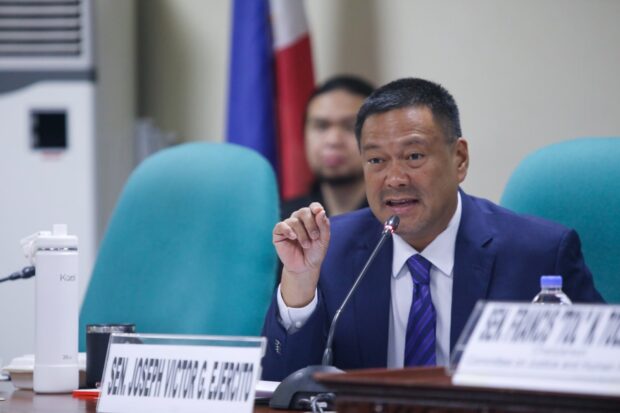
Sen. Joseph Victor “JV” Ejercito (File photo from Bibo Nueva Espana/Senate PRIB)
MANILA, Philippines— The projects or programs under the unprogrammed funds of the national budget for 2024 may include some of lawmakers’ “wish list” that were not accommodated in the regular budget, Senator JV Ejercito said on Tuesday.
At the Kapihan sa Senado, Ejercito pointed out that the unprogrammed appropriation is a regular item in the national budget.
“There will always be unprogrammed funds. Meron naman talaga ‘yan. (There’s really that.) As long as funds are available, it will be used,” he said.
When asked if the budget item can be likened to “pork barrel,” the senator said, “From what I know, it’s itemized also.”
Ejercito explained legislators sometimes request for funds that were not included in Malacañang’s original budget proposal or were not accommodated during the budget deliberations in Congress.
“Hindi naman ma-accommodate lahat, so some will be… yun nga… mailalagay sa unprogrammed funds, yung mga… will not be accommodated in the final line items in the budget,” he said.
(Not everyone can be accommodated, so some will be placed in the unprogrammed funds, those that will not be accommodated in the final line items in the budget.)
“Wish list na ‘yun, so hoping that there will be enough unprogrammed funds by the end of the year to be able to fund these projects that are listed na unprogrammed funds,” the senator added.
(That’s already a wish list, so we are hoping that there will be enough unprogrammed funds by the end of the year to fund these projects that are listed under unprogrammed funds.)
Ejercito, however, stressed that when projects or programs are placed under unprogrammed appropriations, the chances of getting them funded are almost nil.
“’Pag sa Unprogrammed Funds napunta parang suntok sa buwan na ‘yan. Wala na kasiguraduhan. Parang nakasulat sa yelo,” he later said in a Viber message.
(When it comes to unprogrammed funds, it’s a long shot. There’s no certainty. It’s like it’s written on ice.)
Likewise in the Senate, Ejercito noted, most of their budget requests are “institutional amendments.”
“Like in my case: Healthcare, Transportation/Infrastructure, Housing,” he said.
From Malacañang’s original proposal of P281.9 billion, Congress raised the unprogrammed funds to P731.4 billion.
The amounts are contained in next year’s proposed P5.7 trillion General Appropriations Bill (GAB).
The P450 billion increase in the unprogrammed appropriations was exposed and questioned by Senate Minority Leader Aquilino “Koko” Pimentel III.